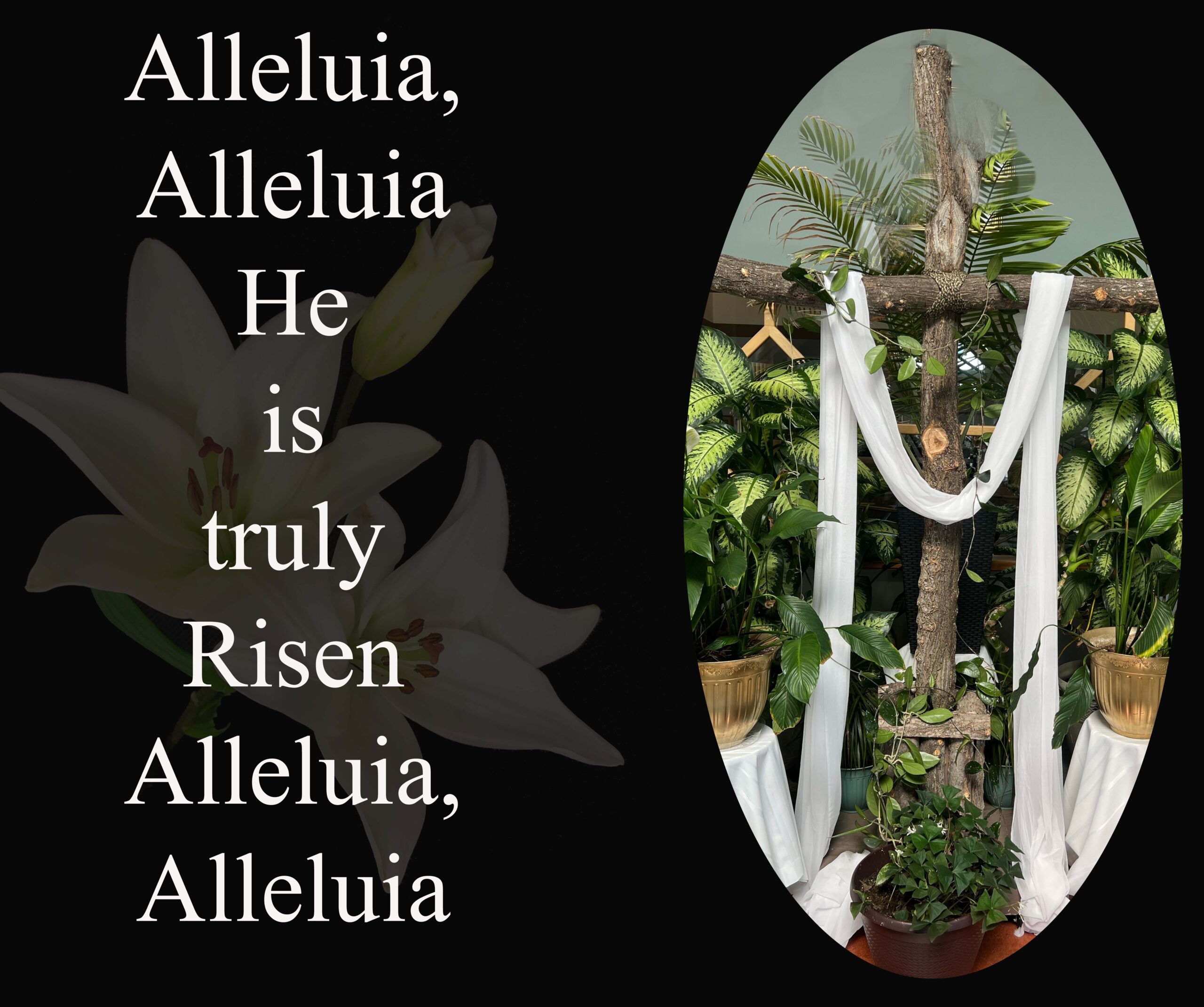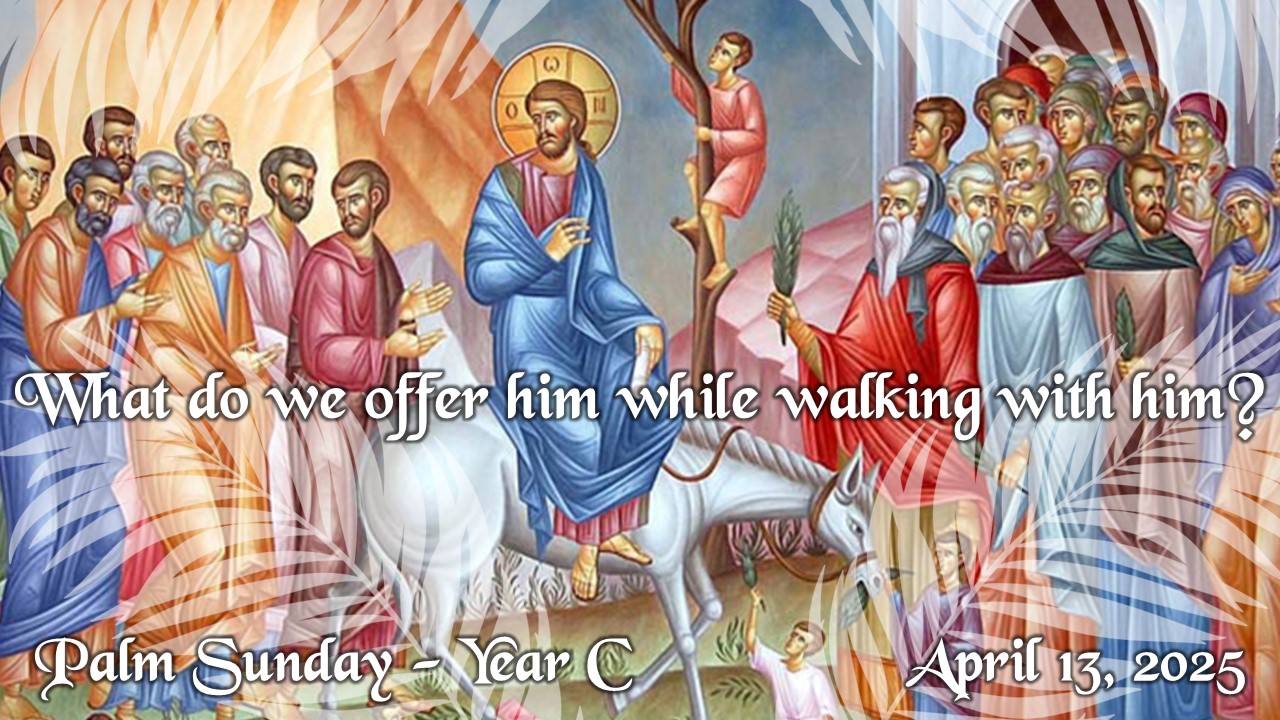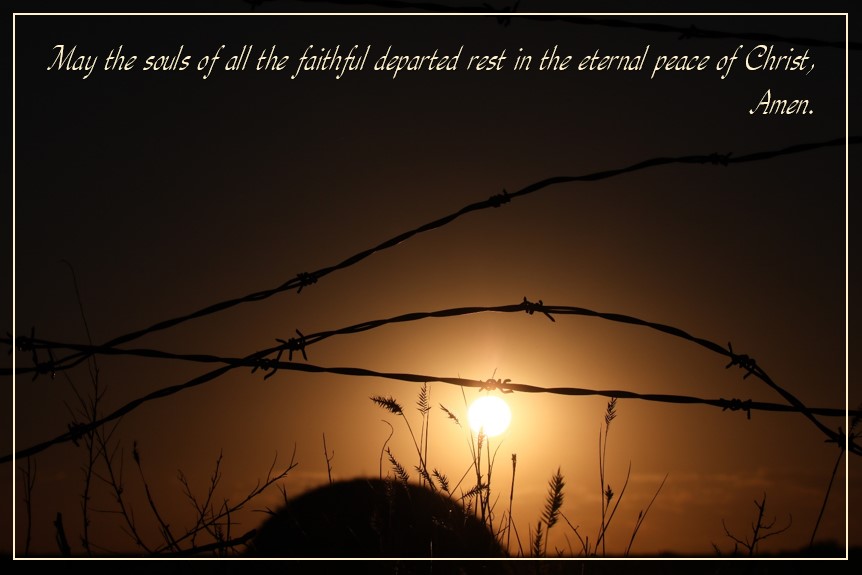
13th Sunday in Ordinary Time Year A ~ July 2, 2023
“WHOEVER” IS WHO?
As we continue our faith journey during the Ordinary Time, we are being invited while enjoying summer to examine our Christian Discipleship. This Sunday’s Scripture Readings are so powerful to pierce our hearts to understand his love for us and our love for him. In the Gospel Jesus has used “whoever” 10 times to call us. Replace the word “whoever” with our own names so that we may love him by denying ourselves and carrying the cross to follow him. By using the word or phrase “whoever” he is letting us choose to whom we belong.
There was a large group of people gathered. On one side of the group stood a man, Jesus. On the other side stood another, Satan. Separating them was a fence running through the group. The scene set, both Jesus and Satan began calling to people in the group. One by one, each having made up his or her own mind, went to either Jesus or Satan. This kept going for a time. Soon enough, Jesus had gathered around him a group of people from the larger crowd, as did Satan.
One man joined neither group. He climbed the fence that was there and sat on it. Jesus and his people left and disappeared, and so too did Satan and his people. The man on the fence sat alone. As this man sat, Satan came back, looking for something which he appeared to have lost. The man said, “Have you lost something?” Satan looked straight at him and replied, “No, there you are. Come with me.” The man said, “But I sat on the fence. I chose neither you nor him.” Satan said, “That’s okay; I own the fence.” And the Lord says, “Whoever is not with me is against me.” – Matthew 12:30
St. Paul rightly says if we are with him and love him then who could separate us from his love; “What then are we to say about these things? If God is for us, who is against us? He who did not withhold his own Son, but gave him up for all of us, will he not be with him and give us everything else? Who will bring any charge against God’s elect? It is God who justifies. Who is to condemn? It is Christ Jesus, who died, yes, who was raised, who is at the right hand of God, who indeed intercedes for us. Who will separate us from the love of Christ? Will hardship, or distress, or persecution, or famine, or nakedness, or peril, or sword? As it is written, “For your sake we are being killed; we are accounted as sheep to be slaughtered.” No, in all these things we are more than conquerors through him who loved us. For I am convinced that neither death, nor life, nor angels, nor rulers, nor things present, nor things to come, nor powers, nor height, nor depth, nor anything else in all creation, will be able to separate us from the love of God in Christ Jesus our Lord” (Romans 8:31-38).
St. Irenaeus reflecting on the relationship between God and humans says, “The glory of God gives life; those who see God receive life. For this reason, God, who cannot be grasped, comprehended, or seen, allows himself to be seen, comprehended, and grasped by men, that he may give life to those who see and receive him. It is impossible to live without life, and the actualization of life comes from participation in God, while participation in God is to see God and enjoy his goodness. Men will therefore see God if they are to live; through the vision of God, they become immortal and attain to God himself. As I have said, this was shown in symbols by the prophets: God will be seen by men who hear his Spirit and are always waiting for his coming. As Moses said in the Book of Deuteronomy: On that day we shall see, for God will speak to man, and man will live. God is the source of all activity throughout creation. He cannot be seen or described in his own nature and in all his greatness by any of his creatures. Yet he is certainly not unknown. Through his Word the whole creation learns that there is one God and Father, who holds all things together and gives them their being. As it is written in the Gospel: No man has ever seen God, except the only begotten Son, who is in the bosom of the Father; he has revealed him”.
He continues to say, “From the beginning the Son is the one who teaches us about the Father; he is with the Father from the beginning. He was to reveal to the human race visions of prophecy, the diversity of spiritual gifts, his own ways of ministry, the glorification of the Father, all due order and harmony, at the appointed time and for our instruction. Where there is order, there is also correct timing; where there is correct timing, there is also advantage. The Word became the steward of the Father’s grace for the advantage of men, for whose benefit he made such wonderful arrangements. He revealed God to men and presented men to God. He safeguarded the invisibility of the Father to prevent men from treating God with contempt and to set before him a constant goal toward which to make progress. On the other hand, he revealed God to men and made him visible in many ways to prevent man from being totally separated from God and so cease to be. Life in man is the glory of God; the life of man is the vision of God. If the revelation of God through creation gives life to all who live upon the earth, much more does the manifestation of the Father through the Word give life to those who see God”.
On the 11th Sunday we reflected about the compassion of Jesus over the crowds without the shepherds. And he called his disciples by name to be sent out for a missionary work with authority to heal and cast out demons and evil spirits. And 12th Sunday did help us to trust in the Lord in times when we are afraid, and life becomes burdensome to live. He says “fear no one” because he is always with us.
And today’s liturgy presents to us the last lines of the missionary discourse in Chapter 10 of the Gospel of Matthew, by which Jesus instructs the 12 Apostles at the moment in which, for the first time, he sends them on mission to the villages of Galilee and Judea. In this final part, Jesus underscores two essential aspects for the life of a missionary disciple: the first, that his bond with Jesus is stronger than any other bond; the second, that the missionary brings not himself, but Jesus, and through Him the love of the heavenly Father. These two aspects are connected, because the more Jesus is at the centre of the heart and of the life of a disciple, the more this disciple is “transparent” to His presence. The two go hand in hand. The poem by unknown author will help us to know and understand why Jesus is focusing on the word/phrase “whoever”:
When I say…”I am a Christian”
I’m not shouting “I am saved”
I’m whispering “I get lost!”
“That is why I chose this way.”
When I say…”I am a Christian”
I don’t speak of this with pride.
I’m confessing that I stumble
and need someone to be my guide.
When I say…”I am a Christian”
I’m not trying to be strong.
I’m professing that I’m weak
and pray for strength to carry on.
When I say…”I am a Christian”
I’m not bragging of success.
I’m admitting I have failed
and cannot ever pay the debt.
When I say…”I am a Christian”
I’m not claiming to be perfect,
my flaws are too visible
but God believes I’m worth it.
When I say…”I am a Christian”
I still feel the sting of pain
I have my share of heartaches
which is why I seek His name.
When I say…”I am a Christian”
I do not wish to judge.
I have no authority.
I only know I’m loved.
“He who loves father or mother more than me is not worthy of me…”, Jesus says. A father’s affection, a mother’s tenderness, the gentle friendship among brothers and sisters, all this, even while being very good and valid, cannot be placed before Christ. Not because he wants us to be heartless and ungrateful, but rather, on the contrary, because the condition of a disciple demands a priority relationship with the teacher. Any disciple, whether a layman or laywoman, a priest or a bishop: an all-absorbing relationship. Perhaps the first question that we must ask a Christian is: “Do you meet with Jesus? Do you pray to Jesus?”. The relationship. One could almost paraphrase the Book of Genesis: Therefore, a man shall leave his father and his mother and cleave to Jesus and the two shall become one (cf. Gen 2:24).
In the words of St. Gregory of Nyssa – Bishop, we can word great comfort in our relationship because “whoever” becomes I, me, we and us. “The happiness God promises certainly knows no limits. When one has gained such a blessing, what is left to desire? In seeing God, one possesses all things. In the language of Scripture, to see is to have. May you see the good things of Jerusalem is the same as May you possess the good things of Jerusalem. When the prophet says: May the wicked man be carried off and not see the glory of the Lord, he means: May he not share in the glory of the Lord. One who has seen God has, in the act of seeing, gained all that is counted good: life without end, everlasting freedom from decay, undying happiness, a kingdom that has no end, lasting joy, true light, a voice to sing pleasingly in the spirit, unapproachable glory, perpetual rejoicing, in a word, the totality of blessing.
Such is the wonderful hope held out by the beatitudes. As we have seen, the condition for seeing God is purity of heart, and now once more my mind is in confusion, as from an attack of giddiness, wondering if purity of heart is something impossible, something beyond the capacity of human nature. If the vision of God is dependent on purity of heart, and if Moses and Paul did not attain this vision—they state that neither they nor anyone else can see God—then the promise of the beatitude spoken by the Word seems to be something impossible of realization.
What do we gain from knowing the means by which God may be seen if we have not the power to see him? It is like saying that one is blessed if one is in heaven because in heaven things are seen that are not seen on earth. If we were told beforehand how to get to heaven, it would be helpful to know that one is blessed if one is in heaven. But as long as the way to heaven is impossible what do we gain by knowing about the happiness of heaven? This only saddens and annoys us when we realize the good things we are deprived of, because it is impossible to get there”.
Surely the Lord does not encourage us to do something impossible to human nature because the magnitude of what He commands is beyond the reach of our human strength. The truth is different. He does not command those creatures to whom he has not given wings to become birds, nor those to whom he has assigned a life on land to live in water. If then in the case of all other creatures the command is according to the capacity of those who receive it and does not oblige them to anything beyond their nature, we shall conclude that we are not to give up hope of gaining what is promised by the beatitude. John and Paul and Moses, then, and any others like them, did not fail to achieve that sublime happiness that comes from the vision of God: not Paul, who said: There is stored up for me a crown of righteousness, which the judge who judges justly will give me, nor John, who leaned on the breast of Jesus, nor Moses, who heard God saying to him, I know you above all others. If it is clear that those who taught that the contemplation of God was beyond their powers are themselves blessed, and if blessedness consists in the vision of God and is granted to the pure in heart, then purity of heart, leading to blessedness, is certainly not among the things that are impossible. Hence it can be said that those who with Paul teach that the vision of God is beyond our powers are right in what they say, and that the voice of the Lord does not contradict them when he promises that the pure in heart will see God.
Holy Father Pope Francis says, ‘Those who allow themselves to be drawn into this bond of love and of life with the Lord Jesus become his representatives, his “ambassadors”, above all in the way of being, of living. To the point that Jesus himself, in sending his disciples on mission, says to them: “He who receives you receives me, and he who receives me receives him who sent me” (Mt 10:40). It is important that the people be able to perceive that for that disciple Jesus is truly “the Lord”; He is truly the centre of his or her life, the everything of life. It does not matter then if, as for every human being, he or she has limitations and even makes mistakes — if he or she has the humility to recognize them; the important thing is that they do not have a duplicitous heart — and this is dangerous. I am a Christian; I am a disciple of Jesus; I am a priest; I am a bishop, but I have a duplicitous heart. No, this is not okay. One must not have a duplicitous heart, but a simple, cohesive heart; one must not keep one foot in two shoes but be honest with oneself and with others. Duplicity is not Christian. This is why Jesus prays to the Father so that the disciples may not fall prey to the worldly spirit. You are either with Jesus, with the spirit of Jesus, or you are with the spirit of the world.
Here our experience as priests teaches us something very beautiful, something very important: it is precisely this welcoming of the holy, faithful People of God; it is precisely that “cup of cold water” that the Lord speaks of today in the Gospel, given with affectionate faith, which helps you to be a good priest! There is a reciprocity in mission too: if you leave everything for Jesus, the people recognize the Lord in you; but at the same time, it helps you to convert each day to him, so as to renew and purify yourself from compromises and to overcome temptations. The closer a priest is to the People of God, the closer you will he feel to Jesus, and the closer a priest is to Jesus, the closer you will he feel to the People of God.
We must also remember that it is not easy most of the time to replace “whoever” with our names because we want to see other people doing things for us. Jesus was complete and dedicated relationship and love with him. The partiality does not work in our disciples but commitment to the fullest.
Perhaps many of you must have this story of the farmer’s chicken who proposed to the cow that they make the farmer breakfast. The cow cheerfully responded: “I’m in! What will we give him?” The chicken replied, “I’ll supply the eggs, and you supply the meat.” The cow’s countenance dimmed as she realized the ramifications of the initial invitation. She sadly replied to the chicken, “For you that’s devotion, but for me it means total sacrifice.” And she walked away.
Are we ready to say to Jesus; That ‘whoever’ is me and I will follow you by denying myself?
Other Sermons In This Series

Easter Sunday – Year B ~ March 31, 2024
March 28, 2024

PALM SUNDAY YEAR C ~ APRIL 13, 2025
April 10, 2025

32nd Sunday in Ordinary Time Year C ~ November 6, 2022
November 04, 2022

